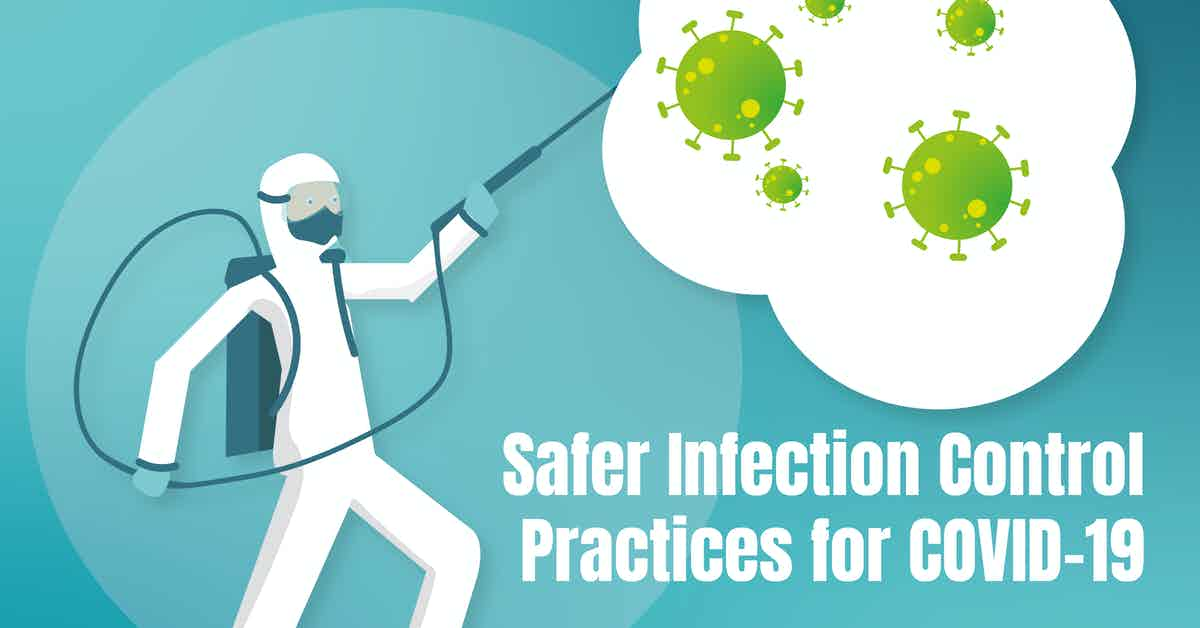The ongoing COVID-19 pandemic has led to an unprecedented demand for cleaning and disinfectant products, many of which can lead to long-term health issues, are potentially deadly, and have been shown to harm the natural environment.

Safely Cleaning and Disinfecting Facilities Against Pathogens and Outbreaks
The rapid spread and rise in cases and deaths associated with SARS-CoV-2 resulted in a run on every cleaning and disinfection product available, regardless of their intended use, recognized claims, or potential hazards, resulting in numerous preventable hospitalizations and deaths.
As an example:
As Americans' obsession with disinfecting their homes against coronavirus rises, so are the number of poisoning emergencies like these, a new government report finds.
In fact, there's been a more than 20% spike in the number of such poisoning emergencies reported to the NPDS, compared to the same time last year, the report found.
Bleach is one of the most common chemicals misused, the CDC team found, with improper use of bleach accounting "for the largest percentage of the increase" in household poisonings since the COVID-19 pandemic took hold.
Hand sanitizers are also a problematic item -- especially for kids.
In another case described by the CDC team, a preschooler was rushed to the hospital after drinking alcohol-based hand sanitizer and passing out.
Her blood-alcohol level reached 273 milligrams per deciliter (most states' drunk-driving limit is 80 mg/dL), and she required overnight treatment in the pediatric ICU before recovering.
Preventing these types of disasters in schools and businesses requires:
- Ongoing service provider training in use and application methods, and;
- Educating the populace, facility occupants, and custodial teams regarding the human and environmental impact of overexposure to toxic chemicals.
Training Best Practices for Safer Facilities
To ensure the highest standards of cleanliness and safety, service providers should receive in-person training regularly.
This helps:
- Assess current understanding of standard operating procedures and safety protocols.
- Introduce new practices and protocols that increase safety and efficiency, and;
- Close any gaps in understanding that may lead to dangerous conditions or reduced occupant satisfaction.
Major topics to cover include:
- Safe product use, handling, and disposal.
- Documented procedures for accessing, reviewing, and updating product safety data sheets.
- Proper use and maintenance of cleaning equipment, especially larger complicated systems, such as automated floor scrubbers and electrostatic disinfection appliances.
- Proper cleaning procedures, specifically those who eliminate surface cross-contamination, and;
- The proper use and disposal of personal protective equipment.
A highly trained service provider is more likely to understand, recognize, and mitigate dangers associated with the toxic chemicals commonly employed in the cleaning industry.
Understanding the Dangers
There are risks associated with using any chemical cleaning product, but some risks are significantly higher and more impactful than others.
The issue and challenges do not stop there.
Of notable concern is the over-application of dangerous disinfection products, which create an environment of overexposure to toxic chemicals.
According to a recent article on CleanLink:
Despite the low likelihood of surface-to-person transmission and the relative ease of deactivating the virus, COVID-19 has nonetheless created a worrying trend — excessive exposure to chemical products that can endanger health.
To reassure people about the safety of indoor spaces during the pandemic, some end users are turning to unnecessary or even counterproductive cleaning and disinfection methods — a practice termed "hygiene theater."
Some products contain chemicals associated with eye, skin or respiratory irritation, asthma, and even cancer or reproductive harm.
These products may also contain volatile organic compounds (VOCs). Health effects from VOC exposure may include:
Eye, nose, and throat irritation.
Headaches, loss of coordination and nausea, [and;]
Damage to liver, kidney, and central nervous system.
The takeaway here is that regularly disinfecting high-touch germ hot spots, especially during cold and flu season or a pandemic, is a good thing.
Still, less toxic chemicals are available and approved for use against SARS-CoV-2, which is susceptible to both regular soap and water, as well as alcohol.
Takeaway
The pandemic scared everyone--there's no shame in that.
Initial reactions to the pandemic due to fear and a lack of knowledge regarding general safety precautions resulting in preventable illness and death is a tragedy.
Fortunately, our knowledge of what works and what does not has increased alongside much-needed communication between facility cleaning personnel and occupants, especially regarding the dangers of cleaning product use and overexposure.
Ongoing training is mandatory to ensure the progress made from hard-learned lessons is maintained and not forgotten with the pending administration of vaccinations.
Outsourcing your organization's cleaning and infection prevention and control requirements to an experienced service provider is a proven method for ensuring the highest facility health and hygiene standards.
If you would like more information regarding the effectiveness of high-performance infection prevention and control measures, or if you would like to schedule a free, no-obligation onsite assessment of your facility's custodial needs, contact us today for a free quote!
In Bakersfield CA, call (661) 437-3253
In Fresno CA, call (559) 206-1059
In Valencia CA, or Santa Clarita CA, call (661) 437-3253
In Palmdale CA, or Lancaster CA, call (661) 371-4756

